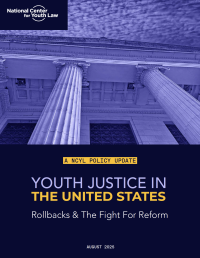Supreme Court Rules that Double Jeopardy Protections Apply to Juvenile Proceedings
Youth May Not Be Tried in Juvenile and Adult Courts for the Same Conduct
On May 27, 1975, the United States Supreme Court unanimously ruled in favor of NCYL’s client Gary Steven Jones, in the case of Breed v. Jones, 421 U.S. 519 (1975). The Supreme Court found that adjudicating youth in Juvenile Court, and then transferring them to the adult criminal system for trial, violates the Double Jeopardy Clause of the U.S. Constitution.
In 1971, when Gary was 17 years old, the Juvenile Court in Los Angeles County initiated proceedings against him. Gary was taken into custody for several weeks until the Juvenile Court could conduct a jurisdictional (or “adjudicatory”) hearing to decide whether he would be made a ward of the Juvenile Court. At the hearing, the prosecution presented testimony from two witnesses, and the Juvenile Court found the allegations against Gary were true. Several weeks later, the Juvenile Court made a finding that Gary was “unfit for treatment as a juvenile” and transferred him to the Superior Court for prosecution as an adult.
Gary filed a petition for a writ of habeas corpus, arguing that transferring him to the adult system for trial, after the Juvenile Court had already found he committed the acts alleged, violated his right to be free from double jeopardy. The Juvenile Court, the California Court of Appeal, and the California Supreme Court all denied his habeas petition. The Superior Court then found Gary guilty of the charge against him and ordered him to be committed.
Gary then sought habeas relief in federal court. After the District Court rejected Gary’s petition, the Ninth Circuit Court of Appeals ruled in his favor. Allen Breed, who was then Director of the California Youth Authority, appealed to the United States Supreme Court.
The Supreme Court agreed with Gary, ruling that his adjudication in Juvenile Court and subsequent transfer to adult criminal court for trial violated the Double Jeopardy Clause of the Fifth Amendment, as applied to the States via the Fourteenth Amendment. The Supreme Court rejected the reasoning of the District Court “that a juvenile is not put in jeopardy at a proceeding whose object is to determine whether he has committed acts that violate a criminal law and whose potential consequences include both the stigma inherent in such a determination and the deprivation of liberty for many years.” The very same concerns underlying the prohibition on double jeopardy in adult court—that of the “psychological, physical, and financial” costs, along with the “heavy personal strain” of enduring two trials—were also present in juvenile proceedings. The jeopardy risk was triggered, the Supreme Court ruled, from the moment “when the Juvenile Court, as the trier of the facts, began to hear evidence.” The Supreme Court rejected the California Youth Authority’s position that the proceedings in adult court constituted nothing more than a “continuing jeopardy” of the process begun in the Juvenile Court. Going forward, states nationwide would have to determine whether they wanted youth to stay within the juvenile system before adjudicating whether they had actually violated a criminal law.
Advocates for youth greeted the Breed decision with applause and relief. The decision was all the more significant because it followed only a few years after the Supreme Court’s ruling in McKeiver v. Pennsylvania that youth in juvenile court did not have the right to a trial by jury. According to one contemporaneous comment, “The negative portent of McKeiver has been greatly diminished by the Court’s willingness to extend an additional constitutional right to juveniles in Breed v. Jones.”
The double jeopardy protections affirmed in Breed impacted youth across the country. Prior to Breed, neither the federal circuit courts nor the state courts observed uniform procedures regarding when a transfer hearing must be conducted or whether scenarios such as Gary’s violated double jeopardy. While some states had safeguards against adjudicating youth before a transfer to adult court, others did not. The Breed ruling also ensured that prosecutors did not have the chance to hear the defense’s case in Juvenile Court before re-trying the issue in adult court, which, as the Ninth Circuit observed when ruling on Gary’s case, would offend “our concepts of basic, even-handed fairness.”
NCYL (at that time called the Youth Law Center), along with co-counsel Peter Bull and Donald W. Pike, represented Gary on his petition in both state and federal court. NCYL argued the case before the United States Supreme Court.





